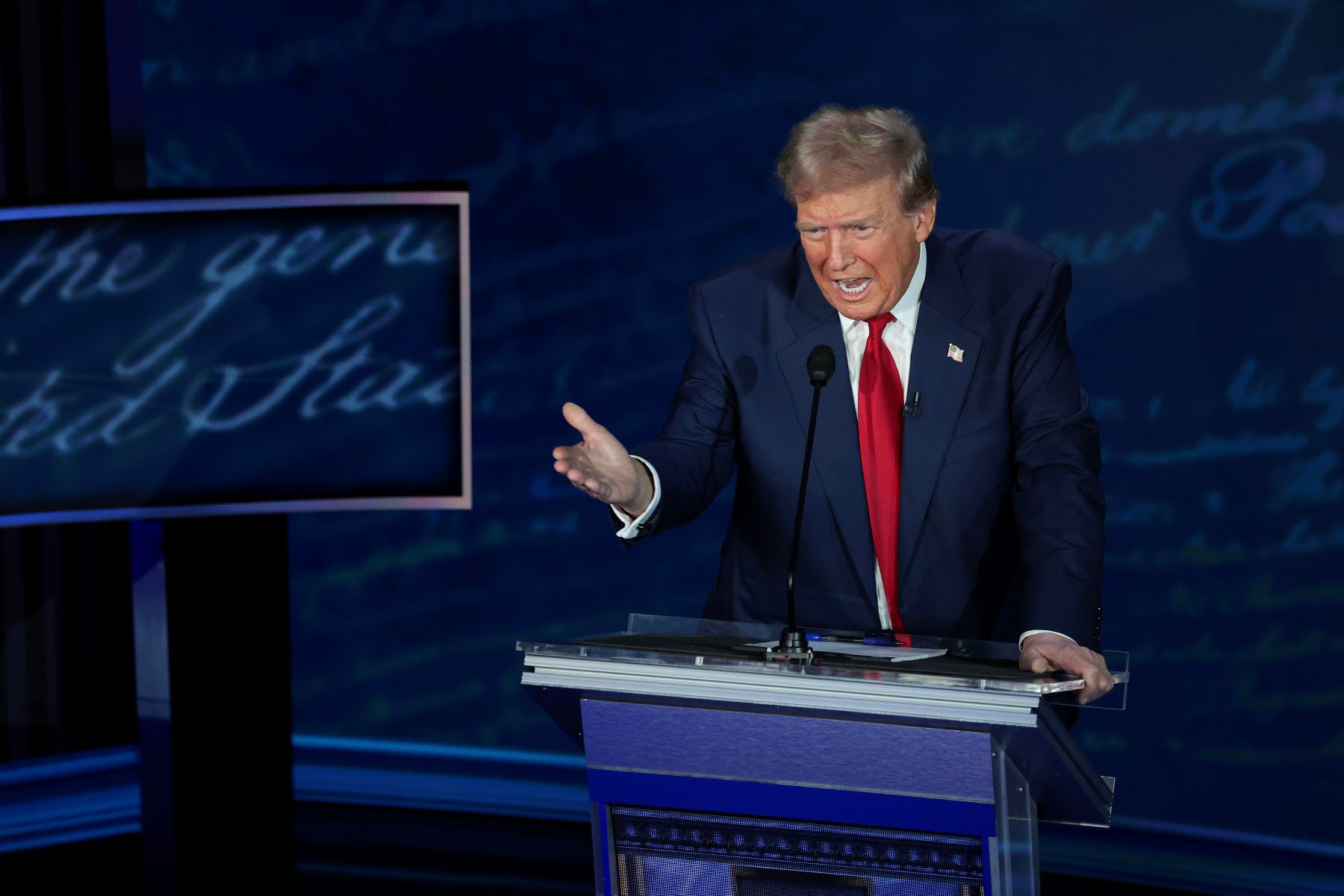Your trusted source for contextualizing Election 2024 news. Sign up for our daily newsletter.
When White House rivals Kamala Harris and Donald Trump met on the debate stage Tuesday night, it took less than 15 minutes for the topic to turn to abortion — and former President Trump immediately launched into an oft-told lie.
Moderator Linsey Davis, who anchors “ABC News Live Prime” and “World News Tonight” on Sundays, noted that Trump had made confusing statements about Florida’s six-week abortion ban and whether he might support a ballot measure that would add abortion protections to the state’s constitution. He eventually said he would vote against it. “Vice President Harris says that women shouldn’t trust you on the issue of abortion, because you’ve changed your position so many times. Therefore, why should they trust you?” Davis asked.
“The reason I’m doing that vote is because the plan is, as you know, the vote, is they have abortion in the ninth month, they even have, and you can look at the governor of West Virginia, the previous governor of West Virginia, not the current governor is doing an excellent job, but the governor before he said, the baby will be born and we will decide what to do with the baby, in other words, we’ll execute the baby — and that’s why I did that, because that predominates, because they’re radical, the Democrats are radical in that,” Trump said.
Trump has repeatedly and falsely claimed that Harris and Democratic-led states want to pass laws that permit abortion until the moment of birth and the execution of babies after birth, something that is already illegal in every state as it is homicide. His claims have been repeatedly fact-checked by a range of news organizations — including NBC, Scripps News and Glamour magazine — and they have all rated them “false.”
Trump’s reference to West Virginia seemed to be a mistake; he may have been aiming to revive a false right-wing claim that former Virginia Gov. Ralph Northam, a Democrat, talked on a radio interview about infanticide.
Trump went on to say that “every legal scholar, every Democrat, every Republican, liberal conservative, they all wanted this issue to be brought back to the states where the people could vote.”
Recent polling done by The 19th and Survey Monkey showed that half of people in states where abortion is banned say the laws in their states are too restrictive, while people in states where abortion is always or mostly legal are more likely to say their states’ laws strike the right balance.
Davis jumped in to fact check Trump in real time — “There is no state in this country where it is legal to kill a baby after it’s born,” she said — before asking Harris to respond.
“Well, as I said, you’re going to hear a bunch of lies, and that’s not actually a surprising fact,” Harris said. “Let’s understand how we got here. Donald Trump hand-selected three members of the United States Supreme Court with the intention that they would undo the protections of Roe v. Wade, and they did exactly as he intended. And now in over 20 states, there are Trump abortion bans, which make it criminal for a doctor or nurse to provide health care.”
Harris said that she had spoken to women around the country who had suffered miscarriages, who had been denied health care by emergency rooms worried about interpreting strict abortion laws in ways that could expose them to legal liability, and who had survived incest and didn’t want to carry a pregnancy to term. She said if Congress were to pass legislation to reinstate the federal protections guaranteed by Roe v. Wade for nearly 50 years, she would sign it. She said Trump, on the other hand, would veto it if it reached his desk.
“Well, there she goes again. It’s a lie. I’m not signing a ban, and there’s no reason to sign a ban because we’ve gotten what everybody wanted, Democrats, Republicans and everybody else, and every legal scholar wanted it to be brought back into the states,” Trump responded.
Since the Supreme Court overturned the federal right to abortion in a 6-3 ruling in Dobbs v. Jackson Women’s Health Organization over two years ago — with three of the conservative bloc’s justices nominated by Trump — 14 states have banned abortions, another six states set gestational limits between six and 12 weeks and five other states cap the procedure between 15 and 22 weeks. Meanwhile, 16 states have set a gestational limit at or near viability, and nine states and the District of Columbia have no restrictions.
-
Read Next:
“What she says is an absolute lie. And as far as the abortion ban, no, I’m not in favor of abortion ban, but it doesn’t matter, because this issue has now been taken over by the states,” Trump continued.
Davis interjected: “Would you veto a net national abortion ban?”
“Well, I won’t have to, because again, two things,” Trump added, explaining that it would be difficult for either party to get abortion legislation through Congress. He then transitioned into details about the Biden administration’s efforts to forgive student loan debt.
Davis prodded: “But if I could just get a ‘yes’ or ‘no’ because your running mate JD Vance has said that you would veto it if it did come to your desk.”
“Well, I didn’t discuss it with JD, in all fairness,” Trump said, again talking about the student loan effort.
Davis then asked Harris: “Would you support any restrictions on a woman’s right to an abortion?”
“I absolutely support reinstating the protections of Roe v. Wade, and as you rightly mentioned, nowhere in America is a woman carrying a pregnancy to term and asking for an abortion, that is not happening — it’s insulting to the women of America,” Harris said.
-
Read Next:
Trump interrupted Harris as she started to talk about how abortion bans have also imperiled access to assisted reproductive technologies like in vitro fertilization, or IVF, which entails creating embryos outside the womb and storing them in a laboratory setting until implantation.
“I’m a leader on IVF, which is fertilization, the IVF. I have been a leader,” Trump said, noting that he criticized an Alabama Supreme Court ruling that applied the concept of fetal personhood to frozen embryos and temporarily halted access in the state. State lawmakers rushed to pass bipartisan legislation, but some IVF providers in Alabama said it was not enough to resume offering the procedure with long-term certainty.
“I have been a leader on fertilization, IVF, and the other things, they you should ask, will she allow abortion in the eighth month? Ninth month? Seventh month?” Trump went on.
“Come on,” Harris said.
“Answer the question ‘Would you veto?’” she continued, without responding to Trump’s query.
Roe protected the federal right to an abortion until fetal viability, which occurs about 24 to 26 weeks into pregnancy; full-term pregnancies are 39 to 40 weeks. Abortions at or after 21 weeks account for only 1 percent of abortions in the country, according to KFF, a health policy foundation. “Claims of abortions occurring ‘moments before birth’ or even ‘after birth’ are false. These scenarios do not occur, nor are they legal in the United States,” several KFF policy analysts wrote in a recent paper.
Recent polling shows that abortion is gaining on the economy as an issue of importance to voters, particularly in battleground states, and it is already the most important issue to women under 45. Some swing states like Arizona and Nevada will have ballot measures this year that would add abortion protections to state constitutions. Democrats are hoping these measures will drive turnout and also boost their chances in the presidential election and other statewide races, including for the U.S. Senate.
David Plouffe, a campaign manager to former President Barack Obama who is advising Harris’ campaign, wrote on the social media site X that there was a “forty point difference with undecided voters on their abortion answers. Widest gap I’ve ever seen in debate dials.”







